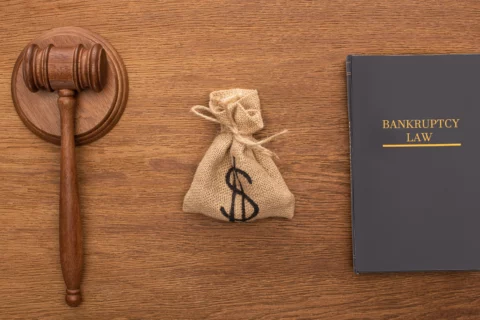Chapter 7 or Chapter 13: Which is Best for You?
Choosing Between Chapter 7 and Chapter 13 Bankruptcy

If you’re having difficulty repaying outstanding debts to your creditors, then you may consider filing for bankruptcy as the last resort to solve debt problems. Bankruptcy is one of the fastest and most effective ways to find debt relief. It is defined as a federal court procedure that helps individuals or businesses eliminate all or a part of their debt or help them pay back a portion of what they owe.
Before you declare bankruptcy, you must know how to choose the best bankruptcy type that will help you wipe out your debt problems and help you achieve a debt settlement. Chapter 7 and Chapter 13 are two common types of bankruptcy. These bankruptcy chapters correspond to portions of the United States bankruptcy code that detail how the debt will be handled during the bankruptcy process. A competent Aurora bankruptcy attorney can help you assess your finances and decide the most appropriate bankruptcy chapter that will work for you.
What is the Difference Between Chapter 7 and Chapter 13?
Chapter 7 bankruptcy is cheaper and faster compared to Chapter 13. However, it may not be the best option for everyone. Even if you are eligible for Chapter 7 bankruptcy, there are some situations when filing for Chapter 13 bankruptcy might be more advantageous than filing for Chapter 7.
If Chapter 7 liquidation bankruptcy doesn’t work for you, then Chapter 13 might be the key to help you pay off all your debts and have a fresh start. The most significant distinctions between the two types of bankruptcy are the eligibility requirements, time frame, and the process of how debts are resolved.
Chapter 7
Chapter 7 or liquidation bankruptcy involves selling a part or all of your assets for you to pay back your debts. In case that you do not own any property and have a tight budget, this is generally the best option for you. Chapter 7 bankruptcy discharges eligible debts such as credit card bills, personal loans, and medical debt. Other types of debts like student loans and taxes may not be suitable.
This bankruptcy chapter doesn’t protect your assets from foreclosure or repossession. If you file Chapter 7, a court-appointed bankruptcy trustee will be responsible for selling your non-exempt properties not covered during bankruptcy.
Chapter 13
Chapter 13 or reorganization bankruptcy allows you to keep your assets or properties. It involves a debt repayment plan that would last up to three to five years. In this bankruptcy chapter, you need to prove to a bankruptcy trustee that you are financially capable of a debt reorganization. Your restructured payment plan requires approval from the court to repay your secured and unsecured debts.
In case you qualify for Chapter 7, you may still choose to file for Chapter 13. This will allow you to keep certain assets or get caught up on their mortgage payments. You can make up the missed payments over time and keep a home or car.
How Do I Qualify for a Bankruptcy Chapter?
Before choosing the bankruptcy chapter to be filed, you must undergo the “bankruptcy means test.” This test is done to analyze income, expenses, and family size to determine eligibility. If your family’s income essential falls below the median income of Illinois, it means that you pass the means test. On the other hand, if the income of your family exceeds the median income, you may still be qualified to pass the means test after you deduct a list of the allowable living expenses.
However, it is important to keep in mind that Chapter 13 bankruptcy can be an expensive option. To qualify, you need to pay your non-dischargeable debts and the value of your non-exempt property using all your disposable income.
How Do I File Bankruptcy?
Whether you intend to file Chapter 7 or Chapter 13 bankruptcy, it is a good idea to seek legal advice from a credible Aurora bankruptcy attorney. They will assist you in filing your bankruptcy paperwork and help ensure that you successfully go through your bankruptcy case.
You may start your bankruptcy filing by accomplishing the free and official online bankruptcy forms from the United States Bankruptcy Court website. You need to fill out the form with the complete details of your present financial status. You need to declare all your assets, liabilities, monthly income, living expenses, bank account information, credit card debt, loan debt, and property transactions. You need to ensure that all the details written on your paperwork are accurate before you file your case to the local court and pay the filing fees.
How Does Bankruptcy Affect my Credit Score?
As a bankrupt individual, you worry about the consequences you might face once you file for bankruptcy. One of the common concerns is the after-effect of bankruptcy on your credit score.
Chapter 7 bankruptcy involves the liquidation of assets to pay your creditors. However, a Chapter 7 bankruptcy stays on your credit reports for up to 10 years from the filing date.
On the other hand, the Chapter 13 bankruptcy will remain on your credit report for seven years. Although it can affect your credit score, there are various ways on how to recover over time. The effect of Chapter 13 bankruptcy will gradually fade with time as you think of ways to improve your credit score. You need to make monthly payments on time because your payment history has the most significant impact on your credit score. Rebuilding credit requires a lot of effort, hard work, and practical debt management skills.
Getting Help from a Bankruptcy Lawyer
Filing for bankruptcy is a significant decision. Bankruptcy can help you achieve debt settlement and financial freedom. However, it has a significant impact on your credit profile, and it can hurt your credit score. Though you can’t do anything about the amount of time bankruptcy remains on your credit report, you can take small steps that will gradually improve your credit score.
Choosing the best bankruptcy chapter for you depends on your present financial situation and future goals. For legal help, do not hesitate to consult our experienced Aurora bankruptcy attorneys at Cutler Bankruptcy. Our Chicagoland bankruptcy law firm will help you determine whether Chapter 7 or Chapter 13 bankruptcy will work for you.


